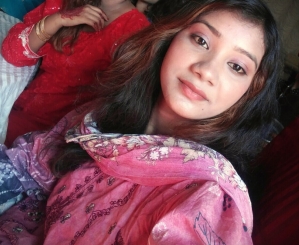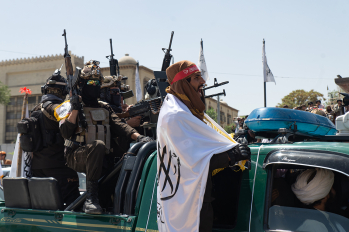
A Christian father in Pakistan who took his 15-year-old daughter out of school to protect her from harassment by a Muslim is now trying to free her from kidnapping and forcible marriage/conversion by the same man, he said.
“It’s been nearly two months now that I’m desperately searching for my minor daughter, Muskan,” Salman Masih of remote Tando Ghulam Ali town in Badin District, Sindh Province, told Christian Daily International-Morning Star News. “She went missing from home on March 11, but despite my frantic appeals to the police for recovering her, my child is still in the custody of her Muslim abductor, Arsalan Ali.”
Masih, a Catholic, filed a report with police within an hour of Muskan’s abduction and pleaded with them for immediate action, but they ignored him, he said.
“After several hours of waiting, I was told that a police team would come to my home the next day, but I would have to pay them 5,000 Pakistani rupees (US$1,793) in ‘fuel cost,’” he said. “The police’s indifferent attitude helped the accused in moving my daughter to a safe location and carrying out his nefarious act.”
Ali, estimated to be between 25 and 27 years old, forcibly converted Masih’s daughter to Islam and forged a marriage certificate as legal cover for the crime, Masih said.
“According to the documents handed to me by the police, the Islamic conversion and Nikah (marriage certificate) were held on the same day Muskan was abducted from home,” he said. “The next day, Arsalan filed a petition in the court of Justice of Peace in Mirpur Khas tehsil in the name of Muskan in which stated that she was an adult aged 19 years and had converted and married of her free will.”
The petition in Muskan’s name also sought police protection citing supposed threats from Masih’s family, he added.
Masih said that his daughter had complained that the suspect used to harass her when she went to school.
“I don’t believe that Muskan has gone with Arsalan willingly, because she herself had told us about his evil actions,” he said. “We brought the matter in to the notice of Arsalan’s family, and they had assured us of reining him in, but he did not stop.”
Masih said he’d been forced to discontinue Muskan’s education due to Ali’s harassment.
“Muskan did not have access to a mobile phone, and she did not go out of the house alone, which is why I believe she had no communication with the accused,” Masih said. “I don’t know how he managed to abduct her from the house on that fateful day.”
The impoverished sanitation worker said he feared Ali would traffic his daughter for sex.
“Arsalan has a notorious reputation in the neighborhood, and I fear something bad will happen to my child if she is not recovered from his custody,” he said. “I appeal to the Christian leadership to help me in finding my daughter and saving her from exploitation.”
His attorney, Luke Victor, said he had filed an urgent motion in the Hyderabad Bench of the Sindh High Court challenging the petition in which Muskan was forced to make false claims about her age, religious conversion and marriage to the kidnapper.
“The Sindh Child Marriage Restraint Act 2013 bars child marriage and mandates penal consequences for any adult person contracting, performing or facilitating the marriage of a child,” Victor said. “According to the anti-child marriage rules, any person authorized to perform or solemnize a marriage is bound to ascertain the age of both the contracting parties to prevent the solemnization of child marriages.”
The Islamic marriage certificate showed that the cleric who solemnized Muskan’s marriage to Ali had intentionally ignored the means for ascertaining the exact age of the girl in order to facilitate child marriage, he said.
“Muskan does not have an official birth document issued by the National Database and Registration Authority (NADRA), but her school certificate attested by the Government Girls Higher Secondary School Tando Ghulam Ali, Badin, states her age as 15 years, hence a minor under the Sindh anti-child marriage laws, which prescribes the legal age for marriage at 18 years for girls,” Victor said.
The burden of proof to substantiate the girl’s age is on the alleged husband and the marriage solemnizer, not on the parents, the attorney said.
“The marriage solemnizer should have sought medical examination to ascertain the girl’s age in the absence of the official birth document, but he did not do so and is therefore liable to be prosecuted for violating the law,” Victor said.
The court also should have noticed the discrepancy in the marriage certificate and ordered an investigation, but instead it admitted the child’s statement and allowed her to remain in the custody of her so-called husband, he said.
“In such matters it is important to send the victim to a shelter home till her exact age is determined through a medical board,” he said.
Criticizing police for not continuing with the investigation, Victor said the order issued by the Justice of Peace did not bar police from investigating the case.
“The court’s order stated that the police should ‘protect’ the couple from the girl’s family, but it does not stop it from investigating the allegation of child marriage,” he said.
The lawyer lamented that a division bench of the Sindh High Court has yet to take up Masih’s petition, putting her life at serious risk.
“We are hoping that the high court will fix our petition for hearing next week and order an investigation to ascertain her age,” he said. “It is regretful that despite the enforcement of the anti-child marriage laws in Sindh, such marriages are continuing with impunity.”
U.N. human rights experts on April 11 called on Pakistan make legal changes in light of continued vulnerability of women and girls of minority faiths to forced marriages and religious conversions. The U.N. special rapporteurs called on Pakistan to raise the legal age for girls to marry to 18 as a deterrent against exploitation in the 96-percent Muslim country.
“The exposure of young women and girls belonging to religious minority communities to such heinous human rights violations, and the impunity of such crimes, can no longer be tolerated or justified,” they said in a statement issued in Geneva.
The experts stressed that child, early and forced marriages could not be justified on religious or cultural grounds. They underscored that, under international law, consent was irrelevant when the victim was a child under the age of 18.
At present Sindh Province is the only one in Pakistan where the legal marriage age for both girls and boys is 18 years, while in Punjab, Khyber Pakhtunkhwa and Balochistan provinces, the minimum for girls is still 16 years.
Pakistan ranked seventh on Open Doors’ 2024 World Watch List of the most difficult places to be a Christian, as it was the previous year.




